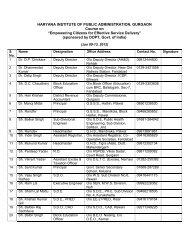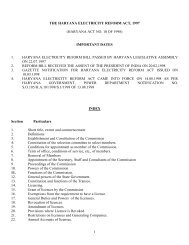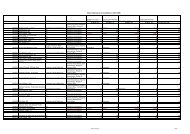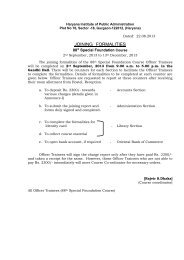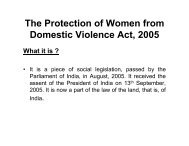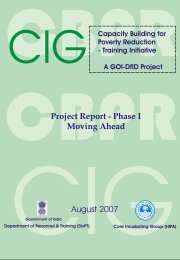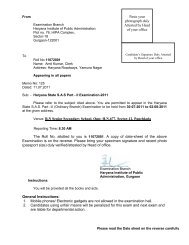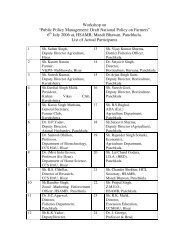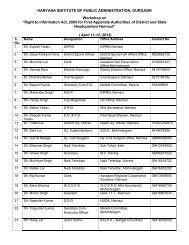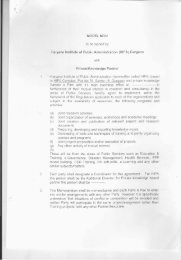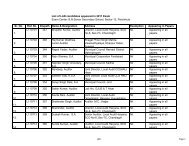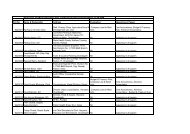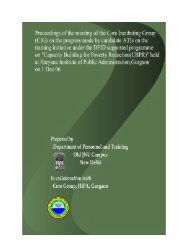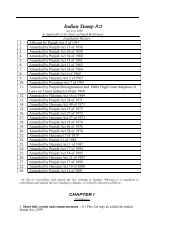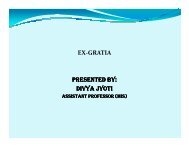Punishment & Appeal Rules Haryanaâ1987 - HIPA
Punishment & Appeal Rules Haryanaâ1987 - HIPA
Punishment & Appeal Rules Haryanaâ1987 - HIPA
You also want an ePaper? Increase the reach of your titles
YUMPU automatically turns print PDFs into web optimized ePapers that Google loves.
<strong>Punishment</strong> & <strong>Appeal</strong> <strong>Rules</strong><br />
Haryana–1987<br />
Devendra Singh<br />
Faculty of Computer Science<br />
<strong>HIPA</strong>
Introduction<br />
The initiation of disciplinary action is the weapon<br />
of last resort, but no doubt it has to be resorted to<br />
in many situations.<br />
Where an employee commit repeated mistakes in<br />
spite of warnings in the past, and disregards the<br />
provisions of Employees’ Conduct <strong>Rules</strong>,<br />
disciplinary proceedings have to be initiated<br />
against him.<br />
The Haryana Civil Services (<strong>Punishment</strong> & <strong>Appeal</strong>)<br />
<strong>Rules</strong> – 1987 lay down the Penalties, which could<br />
be inflicted on the employee and also lays down<br />
the procedure for initiating departmental<br />
proceedings for any misconduct.
Constitutional Provisions – Art. 311:<br />
The entire procedure for departmental proceedings<br />
awarding any punishment stems from Art.311 of<br />
our Constitution .The said article stipulates that<br />
punishment of dismissal, removal or reduction in rank<br />
shall be awarded only by the Appointing authority;<br />
no member of a civil service shall be awarded this<br />
punishment except after an inquiry;<br />
the charged person is given a reasonable opportunity;<br />
and<br />
the requirement of inquiry can be dispensed with under<br />
certain circumstances [Art. 311(2)]
What is reasonable opportunity?<br />
As elaborated by Hon’ble Supreme Court the<br />
reasonable opportunity shall require to be provided to<br />
the charged person:-<br />
An opportunity to deny his guilt and establish his<br />
innocence which he can only do, if he is told what the<br />
charges leveled against him are and the allegations on<br />
which such charges are based;<br />
An opportunity to defend himself by cross-examining<br />
the witnesses produced against him and by examining<br />
himself or any other witnesses to support his defence<br />
and finally;
An opportunity to make his representation as to why<br />
the proposed punishment should be inflicted on him
Procedure for Disciplinary Proceedings:<br />
According to rule 4 of the Haryana Civil Services<br />
(<strong>Punishment</strong> & <strong>Appeal</strong>) <strong>Rules</strong> – 1987, the following<br />
penalties enumerated therein can be for good and<br />
sufficient reasons imposed upon the members of the<br />
Service to whom the said rules are applicable.<br />
A – Minor Penalties<br />
warning with a copy in the personal file (character roll);<br />
censure;<br />
withholding/stoppage of increments of pay without<br />
cumulative effect.<br />
withholding of promotion for a specific period;<br />
Conti…
ecovery from pay of the whole or part of any pecuniary<br />
loss caused by negligence or breach of orders, or the<br />
Central government or a State Government or to a<br />
Company and association or a body of individuals,<br />
whether incorporated or not, which is wholly or<br />
substantially owned or controlled by the Government or<br />
to a local authority set up by an Act of Parliament or of the<br />
legislature of a State during discharge of official duty.<br />
Conti…
Procedure for Disciplinary Proceedings:<br />
B – Major Penalties<br />
<br />
<br />
withholding of increments of pay with cumulative effect.<br />
reduction to a lower stage in the time scale of pay for a<br />
specified period, with further directions as to whether or not<br />
the employee will earn increments of pay during the period<br />
of such reduction and whether on the expiry of such period,<br />
the reduction will or will not have the effect of postponing<br />
the future increments of his pay;<br />
reduction to a lower scale of pay, grade, post or service<br />
which shall ordinarily be a bar to the promotion of the<br />
employee to the time scale of pay , grade, post or service<br />
from which he was reduced, with or without further<br />
directions regarding conditions of restoration to the grade<br />
or post or service from which the employee was reduced<br />
and his seniority and pay on such restoration to that grade,<br />
post or service;
compulsory retirement;<br />
removal from service which shall not be a<br />
disqualification for future employment under the Govt.;<br />
dismissal from service which shall ordinarily be a<br />
disqualification for future employment under the Govt.
PRELIMINARY ENQUIRY (GENERAL)<br />
It is not obligatory in every case to hold a preliminary<br />
enquiry or what is known as fact finding enquiry. However,<br />
when a complaint is received against an employee or<br />
otherwise some act of commission or omission on the part<br />
of the employee comes to the notice of the appropriate<br />
authority, it may be desirable to know as to how far the<br />
imputations or allegations leveled against the employee<br />
concerned have some substance and warrant initiation of<br />
disciplinary action against him.<br />
With this end in view, a preliminary enquiry may be<br />
conducted. The sole purpose of preliminary enquiry is to<br />
decide whether or not there is a prima facie case against the<br />
employee for proceeding against him.
This object can be achieved by holding a preliminary enquiry in different<br />
ways. It may be done by asking for the explanation of the employee<br />
concerned or by holding an enquiry through a departmental officer or by<br />
referring the mater for enquiry to some other agency such as Vigilance<br />
Department or C.I.D.<br />
A brief record of the proceedings should be prepared in writing. The<br />
enquiry should conclude into a report which should contain the findings<br />
as to whether there seems to be some substance in all or some of the<br />
allegations and to what extent a particular employee is responsible.
Action on preliminary enquiry report<br />
The Competent Authority should examine the report and<br />
should decide whether action should be taken for<br />
imposing one of the major penalties. If it is so decided<br />
than an enquiry into the allegations against the employee<br />
should be held, keeping in view the provisions of article<br />
311 (2) and rule 7 of Haryana Civil Services (<strong>Punishment</strong><br />
& <strong>Appeal</strong>) <strong>Rules</strong> – 1987.
Procedure for Inflicting Major Penalty [under<br />
Rule 7 of P & A Regulations<br />
Issue of Statement of charges and allegations<br />
Requisite of a valid charge<br />
Incompetence,<br />
Inefficiency and insubordination,<br />
Neglect of duty,<br />
Absence from duty,<br />
Conduct unbecoming of an officer,<br />
General behaviour un-befitting of his position,<br />
Exercise of usually bad judgment,
Procedure for Inflicting Major Penalty [under<br />
Rule 7 of P & A Regulations<br />
Disloyalty; derogatory remarks against a superior or other<br />
employees,<br />
Absence without leave,<br />
Soliciting bribes,<br />
False statements made in the course of employment;<br />
failure to report when ordered to do so,<br />
Unprofessional conduct,<br />
Uncooperativeness<br />
Mis appropriation of Money or Material
Facilities for copies of records and statements<br />
The charged employee may like to inspect or require copies of<br />
the documents for submitting his explanation to the charge<br />
sheet. Competent Authority is not bound to supply copies of<br />
documents
Who can issue Charge-sheet<br />
The charge-sheet can be issued by –<br />
The appointing authority<br />
The disciplinary authority<br />
Officers other than AA/DA, if authorized by <strong>Rules</strong> Higher Authority<br />
The decision to charge-sheet shall be taken by competent<br />
authority<br />
Competent Authority can amend the charge or can withdraw<br />
charge<br />
Delay in giving charge sheet to be avoided<br />
There is no particular form of charge-sheet<br />
Charge should contain full particulars capable of being<br />
intelligently understood<br />
It is desirable to mention specific name of offence
Reply of the delinquent and its examination:<br />
The delinquent official has to submit his written reply within the<br />
time specified, unless it is extended by the competent authority. It is<br />
not incumbent on the Competent authority to wait indefinitely for the<br />
reply or to give extension of time whenever requested. It is open to<br />
such authority to proceed to hold the enquiry in the absence of any<br />
reply.<br />
In the reply the official is expected to meet the various<br />
allegations on the basis of which the charges had been framed and<br />
to give his own version. If he admits the charges and asks for<br />
mercy, there is an end of the matter and no enquiry need be held. If<br />
the Punishing Authority decides not to award any penalty, the<br />
proceedings should be dropped. If, however, he decides to the<br />
contrary, it would be necessary to give the delinquent a second<br />
show cause notice in order to afford him an opportunity to urge<br />
against the proposed penalty.
In case the competent authority is satisfied with the<br />
explanation given by charged person, it may drop the<br />
charge sheet without resorting to the procedure of<br />
conducting enquiry. Similarly if the competent authority<br />
after considering the reply of the charged person is of the<br />
opinion that awarding of minor punishment shall meet the<br />
end of justice, then the authority competent may award<br />
minor punishment without following the procedure of<br />
conducting the enquiry.<br />
[Haryana Govt. Notification dated 6.7.2007 circulated<br />
vide letter No.62/32/2006-6GSI, dated 23.7.2007]
Rule 8 of the Haryana Civil Services<br />
(<strong>Punishment</strong> and <strong>Appeal</strong>) <strong>Rules</strong> , 1987<br />
Rule 8 of the aforesaid rules, which reads as under, lays down the procedure<br />
which should be followed while imposing any of the minor penalties.<br />
"8. Without prejudice to the provisions of rule 7 no order for imposing a<br />
minor penalty shall be passed on a Government employee unless he has<br />
been given an adequate opportunity of making any representation that he<br />
may desire to make , and such representation has been taken into<br />
consideration.<br />
Provided that this condition shall not apply in a case where an order based<br />
on facts has led to his conviction in a criminal court or an order has been<br />
passed superseding him for promotion to a higher post on the grounds of<br />
his unfitness for that post on account of the existence of unsatisfactory<br />
record:<br />
Provided further that the requirements of this rule may, for sufficient<br />
reasons to be recorded in writing be waived without injustice to the<br />
Government employee concerned”
Rule 9 of the Haryana Civil Services (<strong>Punishment</strong><br />
and appeal) <strong>Rules</strong>, 1987 (Right of <strong>Appeal</strong>).<br />
Rule 9 of the Haryana Civil Services (<strong>Punishment</strong> and<br />
appeal) <strong>Rules</strong>, 1987 (Right of <strong>Appeal</strong>).<br />
Rule 9 of the Haryana Civil Services (<strong>Punishment</strong> and<br />
<strong>Appeal</strong>) <strong>Rules</strong>, 1987, provides for appeal against the<br />
order of the punishing authority. It reads as under:-<br />
Every person to whom these rules apply, shall be entitled<br />
to appeal, as herein after provided, to such superior<br />
authority, as may be prescribed by Government in the<br />
rules regulating his conditions of services against an<br />
order, not being an order of Government within 45 days
Rule 12 of the Haryana Civil Services (punishment and<br />
<strong>Appeal</strong>) <strong>Rules</strong>, 1987 (Second <strong>Appeal</strong>)<br />
Normally there is no right of second appeal. However,<br />
rule 12 provides that a second appeal can be filed in the<br />
cases mentioned therein. Rule 12 of the Haryana Civil<br />
Services (<strong>Punishment</strong> and <strong>Appeal</strong>) <strong>Rules</strong>, 1987<br />
From the above rule, it is clear that a Government<br />
From the above rule, it is clear that a Government<br />
employee can file a second appeal with the sixty days to<br />
such authority as may be prescribed by the Government in<br />
the rules regulating his conditions of service against the<br />
order of the appellate authority by which the penalty has<br />
been increased. There is no right of second appeal where<br />
the appellate authority is the Government.
Rule 13 of the Haryana Civil Services (<strong>Punishment</strong> and<br />
<strong>Appeal</strong>) <strong>Rules</strong>, 1987 (Right of revision).<br />
Rule 13 of the Haryana Civil Services (<strong>Punishment</strong><br />
and <strong>Appeal</strong>) <strong>Rules</strong>, 1987, reads as under:-<br />
"13, After an appeal or the second appeal provided in<br />
rule 12 has been rejected, a person to whom these<br />
rules apply, may apply for revision to such superior<br />
authority as may be prescribed in the rules<br />
regulating his condition of service:
Rule 14 of the Haryana Civil Services (<strong>Punishment</strong> and<br />
<strong>Appeal</strong>) <strong>Rules</strong>, 1987 (Power to call for records).<br />
Rule 14 (1) of the Haryana Civil Services (<strong>Punishment</strong> and<br />
<strong>Appeal</strong> ) rules, 1987 , which deals with this subject , reads<br />
as under:-<br />
"14. (1)The Government or the Head of Department may call<br />
for and examine the records of any case in which a<br />
subroutine authority passed any order under rule 9 or has<br />
inflicted any of the penalties specified in rule 4 or in which<br />
no order has been passed or penalty inflicted and after<br />
making further investigation, if any , may confirm, remit<br />
reduce or subject to provisions of rules 7 and 8 inflict any of<br />
the penalties specified in rule 4 ".
Rule 18 of the Haryana Civil Services (<strong>Punishment</strong> and<br />
<strong>Appeal</strong>) <strong>Rules</strong>, 1987 (withholding of appeals or applications<br />
for revision).<br />
Rule 18 of the Haryana Civil Services (<strong>Punishment</strong><br />
and <strong>Appeal</strong>) <strong>Rules</strong>, 1987, lays down that an authority<br />
subordinate to Government can withhold any appeal<br />
of application for revision.<br />
Memorial



